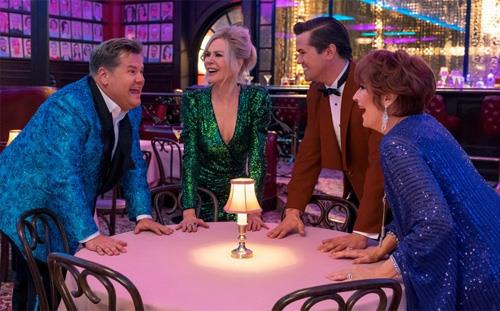
I'm starting to be OK with Ryan Murphy's Netflix deal.
It took me a while. When Murphy signed it two-plus years ago, I grumbled that a streamer had stolen one of TV's best producers, the guy behind everything from Glee to the O.J. Simpson miniseries.
But now comes The Prom, the zestful musical that has just debuted on Netflix (and in a few movie theaters). Chances are, few people except Murphy could have pulled it off.
Certainly, The Prom has flaws. Like many musicals, it has a slow spot in the middle, can't decide when to end, and thinks any point worth making is worth making often.
But those are minor. The lyrics are smart, the music and visuals are vibrant, and the dialog is clever. And the cast is amazing – Meryl Streep, Nicole Kidman, Andrew Rannells, and, especially, James Corden (all at top).
The story was suggested slightly by real life: A Mississippi school district canceled its prom rather than let a student bring her girlfriend. Then some stars gave her a "second-chance prom."
That turn of events was fictionalized by Matthew Sklar and Chad Beguelin, who were somewhat known on Broadway for The Wedding Singer and Elf: The Musical. With writer Bob Martin (The Drowsy Chaperone), they created a story about Emma, an Indiana teen whose prom is canceled because she wants to bring her girlfriend. Some Broadway stars – fresh from a disastrous show – want to polish their reputations by helping her.
The Prom ran nine months on Broadway, getting strong reviews and six Tony nominations (including best musical), but no wins. And it happened to fit Murphy perfectly.
Like Emma, he grew up in Indiana and came out to his parents as a teen. (He was 15, in Indianapolis.) But that was 40 years ago, with no one to assure him things would get better.
Since succeeding, he's been a champion for inclusion.
Murphy's company was perhaps the first to apply a 50/50 rule: Half of all the directors must be women and/or people of color. His shows include plenty of gay and minority characters; one (FX's Pose) focuses on them. And he's taken Broadway's gay-themed shows to a broader audience.
First was The Normal Heart (2014) on HBO, nominated for 16 Emmys and winning two, including best TV movie. This year, for Netflix, he's added The Boys in the Band and The Prom.
Murphy does have one flaw: a tendency for some shows to be one-note. That's why I hated his Nip/Tuck (which most critics liked) and Scream Queens (which lots of others disliked). But mostly, his shows are smart, sharp, and creative.
This time, he also directed and did it superbly.
Given the mid-American story, Murphy used settings we don't often expect in a musical – a high school gym (sometimes decorated, sometimes not), a monster-truck rally, and, for two epic numbers, a shopping mall.
Indeed, that's when The Prom springs back to life; its slow point is followed by its two best scenes: One is tender – Ellen (gifted newcomer Jo Ellen Pellman) sings a heartfelt Internet song to other gay teens – and the other is spectacular, with Rannells leading a mall celebration. From then on, The Prom is sheer pleasure.
My complaint about the Netflix deals is that they take gifted filmmakers away from viewers who don't subscribe to streaming services. In the mainstream, the producers only continue to do shows they'd already launched. For Shonda Rhimes, that's only Grey's Anatomy and Station 19.
Murphy, fortunately, has more shows left. On Fox, there's 9-1-1 and 9-1-1: Lone Star; on FX, there's Pose and anthologies that are easy to bend into new stories – American Crime Story (next is the Bill Clinton impeachment), American Horror Story, and Feud.
Those continue, alongside Netflix shows like The Prom – a bright and vibrant show that few people could have successfully produced.